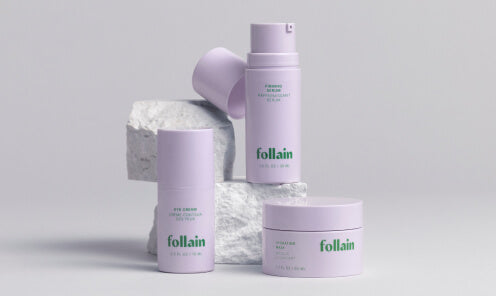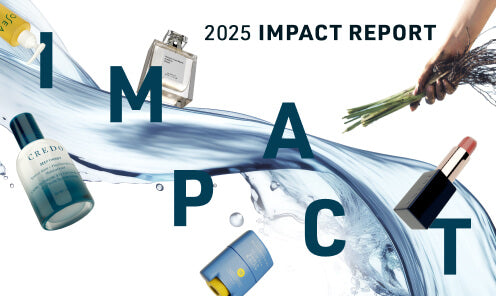Some Good News
It seems like there is a never-ending parade of bad news lately for those of us who care about public health and the environment. But wait: Credo has some good news to share!
This fall, California passed two important pieces of policy, the Cosmetic Fragrance and Flavor Ingredient Right to Know Act (SB312) and the Toxic Free Cosmetics Act (AB2762), were both signed into California law by Governor Gavin Newsom.
About AB2762
The Toxic Free Cosmetics Act, or AB2762 will prohibit 24 toxic ingredients from personal care and beauty products. All 24 of these ingredients were already prohibited by Credo Beauty (and found on our Dirty List) and the European Union. They include mercury, a heavy metal that can cause birth defects & cancer, 2 phthalates that are known reproductive toxicants, 2 parabens that mimic estrogen & disrupt the hormone system, 4 types of formaldehyde that are known human carcinogens, 2 types of phenylenediamines that are cancer-causing hair dye chemicals and 13 “forever” PFAS chemicals (see the full list of banned chemicals.)
“Formaldehyde in bubble bath?” said Janet Nudelman, Director of Program and Policy at Breast Cancer Prevention Partners and Director of BCPP’s Campaign for Safe Cosmetics, one of the bill sponsors. “Mercury in skin lightening creams? Congress has been asleep at the wheel for 82 years when it comes to cosmetic safety, which is why we so appreciate the important leadership Gov. Newsom took today when he signed the Toxic-Free Cosmetics Act into law.” Given that the majority of the chemicals banned by the bill are linked to breast cancer, this historic bill also takes us one step closer to preventing this devastating disease by removing a major source of women’s ongoing exposure to some of the most toxic substances on the planet,” added Nudelman. Credo is a proud supporter of this bill and partner to BCPP.
You might be wondering- why are these chemical stills used in beauty products? One of the biggest impacts of this bill is banning formaldehyde, paraformaldehyde and methylene glycol from cosmetics. This will impact the hair straightening/hair smoothing market - which still admits to using all three of these toxic ingredients.
“Some of the most toxic ingredients are being aggressively marketed to Black women,” said Nourbese Flint, policy director for the Los Angeles-based Black Women for Wellness. “Levels of formaldehyde that could be used to embalm a body are being used in hair straighteners, and Black women who dye their hair are 60 percent more likely to develop breast cancer. That’s why we demand safe cosmetics now. This law means we can finally protect women from the toxic exposures they currently face on every trip to the salon.”
The other key ingredients that are being banned are the two phthalates: dibutyl phthalate (DBP) and diethylhexyl phthalate (DEHP). Dibutyl phthalate (DBP) is still occasionally found listed as an ingredient in nail polishes; DEHP is basically not found listed as an ingredient. But--in a 2018 study, DBP was detected in 90% of 40 nail polishes tested, and DEHP was detected in about 99% of them. Neither chemical was listed as an ingredient in any of the 40 nail polishes, so it is either a “contaminant” or companies aren’t being honest with their ingredients lists.
As the 5th largest economy in the world, companies won’t just reformulate their products for California, they will make their safer products available for everyone, everywhere!
“Women everywhere will benefit from the passage of this bill," said Nudelman. "10 of the chemicals banned by AB2762 are linked to breast cancer, and 9 are linked to an increased risk of COVID-19. These chemicals have no business being in beauty and personal care products women use daily.”
About SB312
No more toxic secrets! With the enactment of SB312, companies will have to disclose secret fragrance and flavor chemicals hiding in beauty and personal care products sold in CA that are toxic to human health or the environment! This includes 26 scientifically recognized fragrance allergens, cancer-causing, reproduction-harming, hormonally active, water and air pollutants and persistent bioaccumulative & toxic chemicals. The Safe Cosmetics Program will then publish this information in their publicly accessible database, here.
If you’re a Credo customer, you probably know that we’ve been pushing for fragrance transparency for a long time. Why? Because most of the time the only information that a customer gets about the “fragrance” is just that it is there. This undisclosed ingredient(s) could be one or two essential oils, or it could be dozens of synthetic chemicals, some of which may be linked to harm. Credo requires brand partners to classify fragrance by its type (essential oils, natural, naturally-derived or synthetic)—because at a minimum we all need to know that--and we really encourage brands to fully disclose all of the ingredients in the fragrance blends.
The Cosmetic Fragrance and Flavor Ingredient Right to Know Act will help our efforts to get more industry disclosure around “fragrance.” The law will require fragrance ingredients to be listed on an internet database, and this will begin to open up the black box of non-disclosure.
Janet Nudelman of Breast Cancer Prevention Partners says, “SB312 recognizes a marketplace where many hundreds of cosmetic companies are now voluntarily fully disclosing their fragrance ingredients, like many Credo Beauty brands, proving that fragrance disclosure is not only possible, it's profitable, because it is what consumers want.”
So will these new law have a big impact? Depends. If CA only does an ingredient list spot check, then maybe not. If the law prevents companies from selling products that contain these chemicals (above trace levels but not listed as intentionally added ingredients) then it could be more far reaching.
Either way, we see this as a step in the right direction. When companies are forced to think through the impacts of the chemistry in the products they sell to consumers every day—and products that salon workers interact with all of the time—that usually results in safer formulas and more transparency.
Thank you, Gov. Newsom, for signing this absolutely necessary legislation into law.
Toxic-Free Cosmetics Act was cosponsored by EWG, Breast Cancer Prevention Partners, Black Women for Wellness and CALPIRG.
Cosmetic Fragrance and Flavor Ingredient Right to Know Act was cosponsored by Breast Cancer Prevention Partners, Campaign For Safe Cosmetics, Black Women for Wellness, CA Healthy Nail Salon Collab












